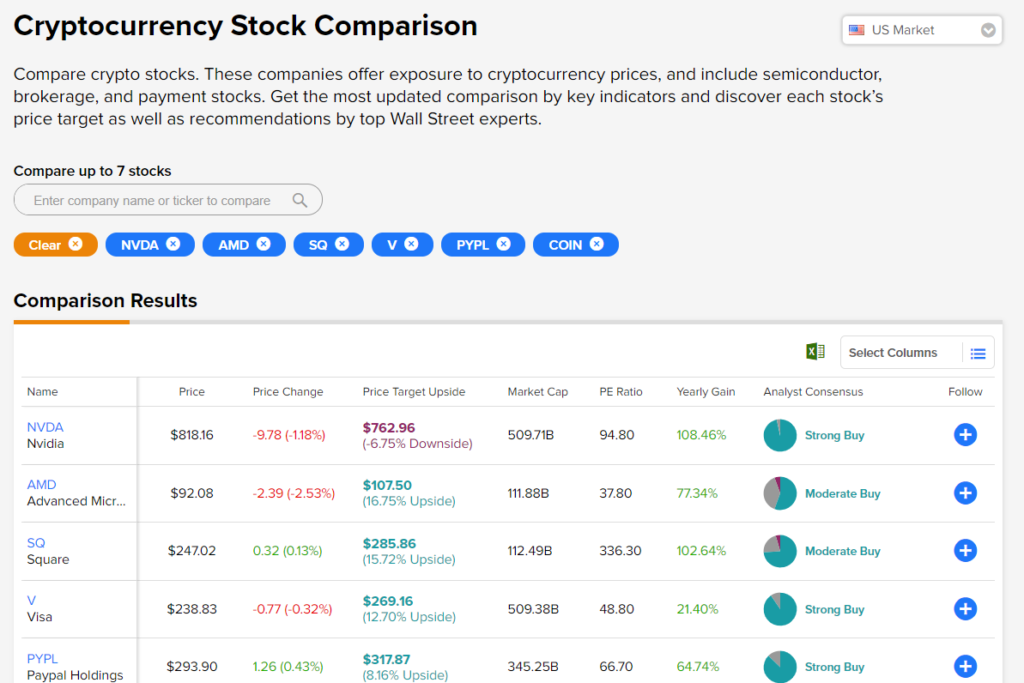Much of blockchain’s mainstream conversation may center on cryptocurrencies, but there is a much wider universe of applications for the technology beyond the highly speculative nature of cryptos.
Elevate Your Investing Strategy:
- Take advantage of TipRanks Premium at 50% off! Unlock powerful investing tools, advanced data, and expert analyst insights to help you invest with confidence.
One of the most proactive use cases centers on the supply chain response to COVID-19. Unlike past pandemics, there are volumes of data surrounding the present scenario, presenting near-ideal conditions for decentralized ledger technology to support the response.
Between the enormous amount of testing results that must be tracked and the cold storage conditions required for vaccine transport, blockchain-based supply chain technology is proven effective daily and might provide the template for future disaster responses. (See Crypto Stock Comparison on TipRanks)

Supply Chain Resilience With Better Data And Oversight
COVID-19 has had a profound economic impact, and the efforts to get people treated, immunized and back to work depend on widespread testing and vaccination. Yet, despite advances in testing and vaccine technology, poor supply chain management can hinder these efforts.
Complexities that arise when so many stakeholders are involved in sensitive materials can make matters even more challenging, and needlessly so. A late 2020 incident with Pfizer’s cold tracking underscores this point. After delivering vaccines in specialty cold storage containers to healthcare providers, Pfizer turned off temperature tracking and monitoring, creating conditions that could have resulted in the early thaw of vaccines. While the U.S. government ended up taking responsibility for tracking temperatures after Pfizer delivered the vaccines, this incident highlights how one change can disrupt an entire process.
Ultracold storage conditions must be maintained for testing kits while in transit. In partnership with Media Sourcery and Varcode, Topl Blockchain has used the situation to put its novel cold chain solution to the test. In terms of COVID-19 testing, where maintaining certain temperatures is imperative, Topl’s blockchain-powered infrastructure has been instrumental in tracking end-to-end shipping conditions.
Through the collaboration with Varcode, every test kit shipment features advanced barcodes known as “Smart Tags,” which share accurate time and temperature information when scanned. All these data points are then uploaded to the blockchain, where they are secure and transparently viewable.
For testing kits that must be stored at -20 degrees Celsius throughout the testing cycle, this takes on unique importance. The proof of concept is there, following the successful tracking of 15,000 tests. Now, there are plans to scale up for another 1,000,000 tests, highlighting the program’s potency.
According to Chris Goergen, Topl’s Chief Architect, “Once information is committed to the Topl Blockchain, it can no longer be altered without leaving a record of this update. Unlike traditional systems where a single party can control access to, and even censor or manipulate, the data, blockchain-powered traceability systems enable all supply chain actors to directly control the information they submit and maintain sovereignty over their records.”
More Data, Better Collection, And Easier Integration
Topl Blockchain is far from the only technology answer to the pandemic’s supply chain demands. Logmore, a data logging platform designed to reduce redundancies during the end-to-end shipping process, uses tags with its novel dynamic QR codes to update air freight companies and last-mile vaccine clinic managers alike.
In addition to its ability to avoid disruption to the existing shipping process, this technology bears the advantage of needing no infrastructure investment to support it. The company reports that its technology has been used to ship some 10 million COVID-19 vaccine doses to date.
Instead of having different stakeholders use multiple solutions simultaneously, Logmore can reduce these inefficiencies, tracking shipments throughout their duration. In addition, companies can integrate the data via API thanks to Logmore’s “open data” approach. This approach has been designed to make data more accessible and transparent, thereby reducing overall supply chain monitoring costs in kind.
Putting this solution in the context of COVID, there are multiple stakeholders in a given shipment, whether the shipment involves vaccines or testing kits. Often, each shipment is accompanied by numerous tracking devices and data logging tools.
By incorporating easily accessible data collected by Logmore’s solution and plugging it via blockchain API into a transparent blockchain like Topl, the entire process could be streamlined. That effectively reduces resources, waste, and errors simultaneously. Taking it a step further, smart contracts can be deployed to govern and handoff shipment custody, adding an extra layer of security to the process. Best of all, these processes in tandem can deliver better quality assurance, which is vital for the successful rollout of the vaccine and meeting ongoing testing requirements.
Logmore CEO and Co-Founder Niko Polvinen underlines this point, remarking, “Granular data is crucial for tailoring effective disaster response, and COVID-19 is no different. By unifying data collection and reporting technology, we can eliminate untold amounts of waste while guaranteeing a more transparent, visible process for supply chain monitoring. For industries such as healthcare, where chain of custody and accurate shipping data is so vital, our solution can provide a meaningfully better experience for all stakeholders.”
Data To The Rescue
COVID-19 might seem like an extreme case, but these very technologies can play a pivotal role in supply chain management, especially for food supplies that require cold storage. Whether it involves Whole Foods’ tracking of fish deliveries directly from the fisheries and monitoring temperatures along the way, or its tracking of produce from the farm, data can be a potent force in reducing waste.
Moreover, while the pandemic presents a strong proving ground for blockchain and data collection, the use cases can be applied to just about any phase of the end-to-end shipping process. Besides for proving that blockchain isn’t just about speculation, this case highlights the immense potential for distributed ledger tech (DLT) to add value for all stakeholders along the chain of custody.
Disclaimer: The information contained herein is for informational purposes only. Nothing in this article should be taken as a solicitation to purchase or sell digital assets.
















